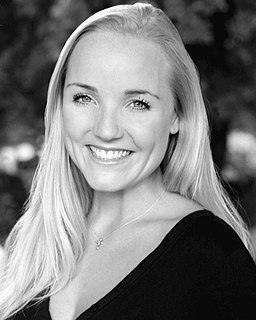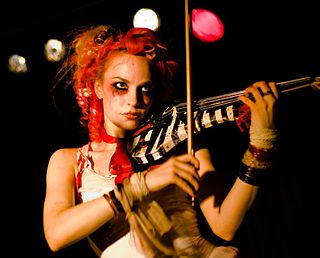A Quote by Cynthia Nixon
What was really great with Eleanor Roosevelt - I mean, of course, we all have this stereotypical, really satirical almost, version of how she speaks. What was really interesting to me was I found various radio and TV appearances of hers, but there was one talk show that I saw her on; she was the only woman, it was all men. They were talking about policy - I think it was after she was First Lady. I think it was more in the U.N. days.
Quote Topics
Related Quotes
It's interesting to me that really one of the first things she [Eleanor Roosevelt]did as First Lady was to collect her father's letters and publish a book called The Letters of My Father, essentially, hunting big game, The Letters of Elliott Roosevelt. And it really was an act of redemption, really one of her first acts of redemption as she entered the White House. She was going to redeem her father's honor. And publishing his letters, reconnecting with her childhood really fortified her to go on into the difficult White House years.
Eleanor Roosevelt loved to write. She was a wonderful child writer. I mean, she wrote beautiful essays and stories as a child. And Marie Souvestre really appreciated Eleanor Roosevelt's talents and encouraged her talents. Also, she spoke perfect French. She grew up speaking French. She's now at a french-speaking school where, you know, girls are coming from all over the world. Not everybody speaks French.
I think Eleanor Roosevelt always had a most incredible comfort writing letters. I mean, she was in the habit of writing letters. And that's where she allowed her fantasies to flourish. That's where she allowed her emotions to really evolve. And that's where she allowed herself to express herself really fully, and sometimes whimsically, very often romantically. And it really starts with her letters to her father, who is lifelong her primary love.
It's right around this time that her Grandmother Hall dies. And Eleanor Roosevelt is responsible for making all the funeral arrangements. And there are a couple of things that she really understands, as she contemplates her grandmother's life and makes the funeral arrangements. One, she's really talented, an organizational woman. She knows how to do things. She begins to compare her life to her grandmother's life. And it's very clear to her that being a devoted wife and a devoted mother is not enough.
I think that Eleanor Roosevelt really learned about the limits of power and influence from Arthurdale. She could not make some things happen. And she particularly learned that she could not, just because she was nominally in charge, she could not change people's hearts and minds; that a very long process of education would result before race was on the national agenda. And it really did move her into the racial justice arena with both feet. She came out fighting.
I think that, very often there's a pain that's just too painful to touch. You'll break apart. And I think her mother's death and disappearance and abandonment was something she just never could deal with. Eleanor Roosevelt, when she's really very unwell in 1936, she takes to her bed. She has a mysterious flu.
On international relations, Eleanor Roosevelt really takes a great shocking leadership position on the World Court. In fact, it amuses me. The very first entry in her FBI file begins in 1924, when Eleanor Roosevelt supports American's entrance into the World Court. And the World Court comes up again and again - '33, '35. In 1935, Eleanor Roosevelt goes on the air; she writes columns; she broadcast three, four times to say the US must join the World Court.
Studies show: Intelligent girls are more depressed Because they know What the world is really like Don't think for a beat it makes it better When you sit her down and tell her Everything gonna be all right She knows in society she either is A devil or an angel with no in between She speaks in the third person So she can forget that she's me
I think the fact that she [Eleanor Roosevelt] was a woman probably in those days would have been an additional criticism, although first ladies by definition in those days were women. There's always been a problem and still is, about the role the first lady should play, of course. Everybody's seen it in Jackie Kennedy and Nancy Reagan and, heaven knows, Hillary Clinton. So the problem has not been solved.
When I was a young woman, I had this friend who was really beautiful, and she would talk about how she was losing her looks, that she wasn't as pretty as she once was. She was gorgeous, and I thought, I'm going to stop this bad habit of self-criticism that I think a lot of women get into. You make a choice to be different.
And when she started becoming a “young lady,” and no one was allowed to look at her because she thought she was fat. And how she really wasn’t fat. And how she was actually very pretty. And how different her face looked when she realized boys thought she was pretty. And how different her face looked the first time she really liked a boy who was not on a poster on her wall. And how her face looked when she realized she was in love with that boy. I wondered how her face would look when she came out from behind those doors.
Her mother died at the age of 29, essentially turning her face to the wall and deciding to die. And so we can only imagine the agony she felt. And Eleanor Roosevelt really wanted to make her mother happier, and - and to make her live, you know, make her want to live. And there's something about, you know, when your mother dies, this sense of abandonment. I think Eleanor Roosevelt had a lifelong fear of abandonment and sense of abandonment after her parents' death.




























